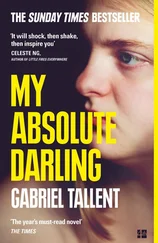Me. Say you lived at least partly for me .
This is the story that must exist somewhere; this is what she never finds to read.
This was his life now, his real life, the thing he thought about most: his boy was in and out of trouble and he didn’t know what to do.
Friday night when he got home late from the mill Daisy made him shower before supper, and he twisted the dial to its hottest setting and turned his back to the gimmicky showerhead whose spray never pulsed hard enough to perform the virtual massage its advertising promised — or maybe at forty-three he’d used his body too hard, its aches and pains as much a part of him now as his heart or any other organ, and he had wasted good money on an illusion. Ah well. He rubbed at mirror fog and told the dark-browed frowner (his own father!) to get ready: she’d had her Victor look. Whatever this development was, it fell somewhere between failing grade in calculus and car wreck, either of which, he knows from experience, would have been announced as soon as he walked through the door. Whatever the case, the news was bad enough that she felt she needed to lay the groundwork and had already set their places at the table and poured his beer, a habit he disliked but had never objected to and never would. When she was a girl, Daisy’s father had let her tilt the bottle over his glass while the bubbles churned and the foam puffed like a mushroom cap sidling up from dank earth, and if she enjoyed some echo of the bliss of being in her daddy’s good graces while pouring his beer, Sean wasn’t about to deprive her.
Daisy told him:
Neither girl seemed very brave, yet neither seemed willing to back down. Not their own wounds, but a sturdy sense of each other’s being wronged, had driven them to this. They had a kind of punk bravado, there on the threshold, armored in motorcycle jackets whose sleeves fell past their chipped black fingernails. A flight of barrettes had attacked their heads, pinching random tufts of dirty hair. They were dressed for audacity, but their pointy-chinned faces — really the same face twice — wore the stiff little mime smiles of the easily intimidated, confronting her, the tigress mother, bracing their forlorn selves as best they could, which wasn’t very well at all. There was nothing to do but ask them in. As she told it to Sean, Daisy wasn’t about to let them guess that A, she pitied them, and B, she understood right away there was going to be some truth in what they said. Victor’s favorite sweater, needing some mending, lay across the arm of the sofa, and when one of the twins took it into her lap — talisman, claim — Daisy hardly needed to be told that girl was pregnant. As the twins took turns explaining that not just one of them was in trouble, both were, an evil radiance pulsed in the corner of Daisy’s right eye, the onset of a migraine.
A joke , Sean said. Because, twins? Somebody told these girls to go to V’s house and freak out his parents.
Drinking around a bonfire, Daisy said, and they wander into the woods and stumble across this mattress. They have a word for what happened. Three-way. They have a word for it, so ask yourself what else these girls know. Why they have no sense of self-worth. Their mother’s in Arizona, their daddy’s a trucker, never around.
Across the table Sean shook his head, his disgust with his son failing, for once, to galvanize Daisy’s defense of the boy. In the harmony of their anger, they traded predictions. Victor would be made to marry a twin, maybe the one whose dark eyes had acquired a sheen of tears when she petted his old sweater, because she seemed the more lost. Victor would be dragged under.
“When’s he get home?” Sean said.
“Away game. Not till two A.M.” It was Daisy who would be waiting in her SUV when the bus pulled up at the high school to disgorge the sleepy jostling long-legged boys.
“We hold off on doing anything till we hear his side of the story.”
We hold off? If she hadn’t loved him she would have laughed when he said that. It wouldn’t be up to them to hold off or not hold off, but if Sean was slower to accept that reality than she was, it was because he hated decisions being out of his hands.
However disgusted he’d been the night before, in the morning Sean was somber, mindful, restrained, everything Daisy could have wished when he sat Victor down at the kitchen table for what he called getting the facts straight . The reeling daylong party was true, and the bonfire, and the rain-sodden mattress in the woods where a drunken Victor had sex with both girls, though not at the same time, which was what three-way meant. They must have claimed that for dramatic impact, as if this scenario needed more drama, or because they had been so smashed that events blurred together in their minds. The next several evenings were taken up with marathon phone calls. Sean asked most of the questions and wouldn’t hand the receiver to Daisy even when she could tell he’d learned something especially troubling and mouthed Give it to me! By the following weekend they had established that only one twin was pregnant, though it seemed both had believed they were telling the truth when they sat on Daisy’s velvet couch and said the babies, plural, were due July fifth. The sweater-petting girl told Sean she had liked Victor for a long time— years —and had wanted to be with him, though not in the way it had finally happened. Questioned, Victor remembered only that they were twins. He knew it sounded bad but he wasn’t sure what they looked like. Nobody was quote in love with him: that was crazy. And no, they hadn’t tried to talk to him first, before coming to the house, and was that fair, that they’d assumed there was zero chance of his doing the right thing? And why was marriage the right thing if he didn’t want it and whoever the girl was she didn’t want it and it was only going to end in divorce? The twin who was pregnant had the ridiculous name of Esme, and what she asked for on the phone with Sean — patient, tactful Sean — was not marriage but child support. If she had that she could get by, she insisted. She’d had a sonogram and she loved the alien-headed letter C curled up inside her. At their graduation dance she shed her high heels and flirted by bumping into the tuxes of various dance partners. Victor followed her into the parking lot. Below she was flat-footed and pumpkin-bellied; above she wore strapless satin, her collarbones stark as deer antlers. He backed her up against an anonymous SUV hard enough that their first sober kiss began with shrieks and whistles.
In the hushed joyous days after the baby was born Sean made a mistake he blamed partly on sleep deprivation. The narrow old two-story house had hardly any soundproofing, and because Victor and Esme’s bedroom was below his and Daisy’s, the baby’s crying woke them all. He had stopped in the one jewelry store downtown and completely on impulse laid down his credit card for a delicate bracelet consisting of several strands of silver wound around and around each other. Though simple, the bracelet was a compelling object with a strong suggestion of narrative, as if the maker had been trying to fashion the twining, gleaming progress of several competing loves. He was the sort of husband who gets teased for not noticing new earrings even when his wife repeatedly tucks her hair behind her ears, and any sort of whimsical expenditure was unlike him, but he found he couldn’t leave the store without it. He stopped for a beer at the Golden West, and when he got home the only light was from the kitchen where Esme sat at the table licking the filling from Oreos and washing it down with chocolate milk. Her smile hoped he would empathize with the joke of her appetite rather than scold the late-night sugar extravaganza as, he supposed, Daisy would have done, but it was the white-trash forlornness of her feast that got to Sean — the cheapness and furtiveness and excessive, teeth-aching sweetness of this stab at self-consolation. With her china-doll hair and whiter-than-white skin she was hardly the menace to their peace they had feared, only an ignorant girl who trusted neither her new husband nor her sense that it was she and not her mother-in-law who ought to be making the big decisions about the baby’s care. Esme wet a forefinger and dabbed the crumbs from Daisy’s tablecloth as he set the shiny box down next to her dirty plate. She said, “What is this?” and, that fast, there were tears in her eyes. She didn’t believe it was for her, but she’d just understood what it would feel like if the little box had been hers, and this incredulity was his undoing: before those tears, he had meant only to ask Esme if she thought Daisy would like the bracelet. Now he heard himself say, “Just something for the new mama.” As soon as she picked the ribbon apart, even before she tipped the bracelet from its mattress of cotton, he regretted his impulsiveness, but it was too late. She slid it onto her wrist and made it flash in the dim light, glancing to invite his admiration or maybe try to figure out, from his expression, what was going on. In the following days he was sorry to see that she never took it off. Fortunately the household was agitated enough that nobody else noticed the bracelet, and he began to hope his mistake would have no ill consequences except for the change in Esme, whose corner-tilted eyes held his whenever he came into the room. Then, quick, she’d turn her head as if realizing this was the sort of thing that could give them away. Of course there was no them and not a fucking thing to give away. Sean began to blame her for his uneasiness: she had misconstrued an act of minor, impulsive charity, blown it up into something more, which had to be kept secret. The ridiculousness of her believing he was interested was not only troubling in its own right, it pointed to her readiness to immerse herself in fantasy, and this could be proof of some deeper instability. He didn’t like being looked at like that in his own house, or keeping secrets. He was not a natural secret keeper, but a big-boned straightforward husband. Since he’d been nineteen, a husband. Daisy came from a background as rough as anybody’s, her father a part-time carpenter and full-time drunk who had once burned his kids’ clothes in the backyard, the boys running back into the house for more armfuls of sweatshirts and shorts, disenchanted only when their dad made them strip off their cowboy pajamas and throw those in too. The first volunteer fireman on the scene dressed the boys in slickers that reached to their ankles and bundled their naked teeth-chattering sister into an old sweater that stank of crankcase oil, and to this day when Sean changes the oil in his truck he has to scrub his hands outside or Daisy will run to the bathroom to throw up.
Читать дальше












